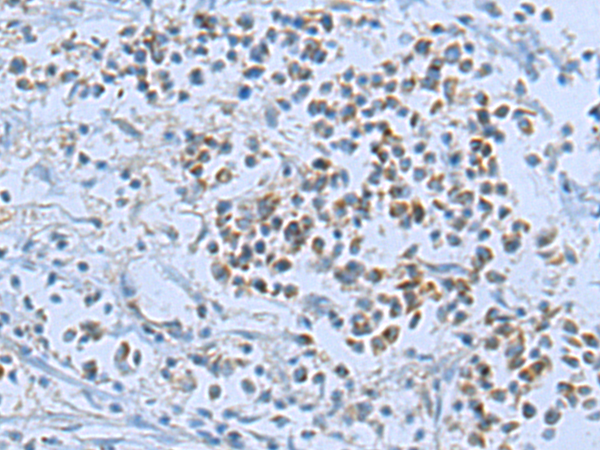
| WB | 咨询技术 | Human,Mouse,Rat |
| IF | 咨询技术 | Human,Mouse,Rat |
| IHC | 1/50-1/100 | Human,Mouse,Rat |
| ICC | 技术咨询 | Human,Mouse,Rat |
| FCM | 咨询技术 | Human,Mouse,Rat |
| Elisa | 1/5000-1/10000 | Human,Mouse,Rat |
| Aliases | ARHE; Rho8; RhoE; memB |
| Host/Isotype | Rabbit IgG |
| Antibody Type | Primary antibody |
| Storage | Store at 4°C short term. Aliquot and store at -20°C long term. Avoid freeze/thaw cycles. |
| Species Reactivity | Human, Mouse, Rat |
| Immunogen | Fusion protein of human RND3 |
| Formulation | Purified antibody in PBS with 0.05% sodium azide and 50% glycerol. |
+ +
以下是关于RND3抗体的3篇参考文献及其摘要内容:
1. **文献名称**: "Rnd3 regulates lung cancer cell proliferation through notch signaling"
**作者**: Li et al. (2014)
**摘要**: 该研究利用RND3抗体通过Western blot和免疫组化分析,发现RND3在非小细胞肺癌中低表达,并证实其通过抑制Notch信号通路调控肿瘤细胞增殖和凋亡,提示RND3可能作为抑癌因子发挥作用。
2. **文献名称**: "RhoE/Rnd3 modulates neuronal morphogenesis via interaction with sonic hedgehog signaling"
**作者**: Pacary et al. (2011)
**摘要**: 研究通过免疫荧光技术结合RND3抗体,揭示了RND3在小脑颗粒神经元中的表达模式,并发现其通过调控Shh信号通路影响神经元突起的生长和分支,表明RND3在神经发育中具有关键作用。
3. **文献名称**: "Rnd3 interacts with ERK signaling to regulate endothelial cell migration and vasculogenesis"
**作者**: Bek et al. (2016)
**摘要**: 使用RND3抗体进行免疫共沉淀和细胞定位分析,发现RND3与ERK通路相互作用,抑制内皮细胞迁移和血管生成,为RND3在血管疾病中的治疗潜力提供了实验依据。
这些文献均通过RND3抗体在蛋白质水平验证其表达及功能,涵盖肿瘤、神经及血管系统研究,展示了RND3的多效性调控机制。
The RND3 antibody is a research tool designed to detect and study RND3 (Rho Family GTPase 3), also known as RhoE, a member of the atypical Rho GTPase subfamily. Unlike classical Rho GTPases, RND3 lacks intrinsic GTPase activity and remains constitutively active, functioning as a key regulator of cytoskeletal dynamics, cell migration, and apoptosis. It antagonizes RhoA/ROCK signaling pathways, influencing cellular processes such as stress fiber formation, cell adhesion, and neurite outgrowth. Dysregulation of RND3 has been implicated in cancer, neurodegenerative disorders, and cardiovascular diseases.
The RND3 antibody is widely used in techniques like Western blotting, immunohistochemistry, and immunofluorescence to assess protein expression, localization, and interactions in various biological samples. Researchers employ it to explore RND3's roles in tumor suppression, metastasis, and neuronal development. For instance, studies have linked RND3 downregulation to increased cancer invasiveness, while its overexpression may inhibit tumor progression. In neurological contexts, RND3 is associated with axonal guidance and synaptic plasticity.
Commercial RND3 antibodies are typically validated for specificity using knockout controls or siRNA-based approaches. However, variability in clonal sources (polyclonal vs. monoclonal) and epitope targets necessitates careful selection based on experimental requirements. This antibody remains critical for deciphering RND3's molecular mechanisms and therapeutic potential in disease models.
×